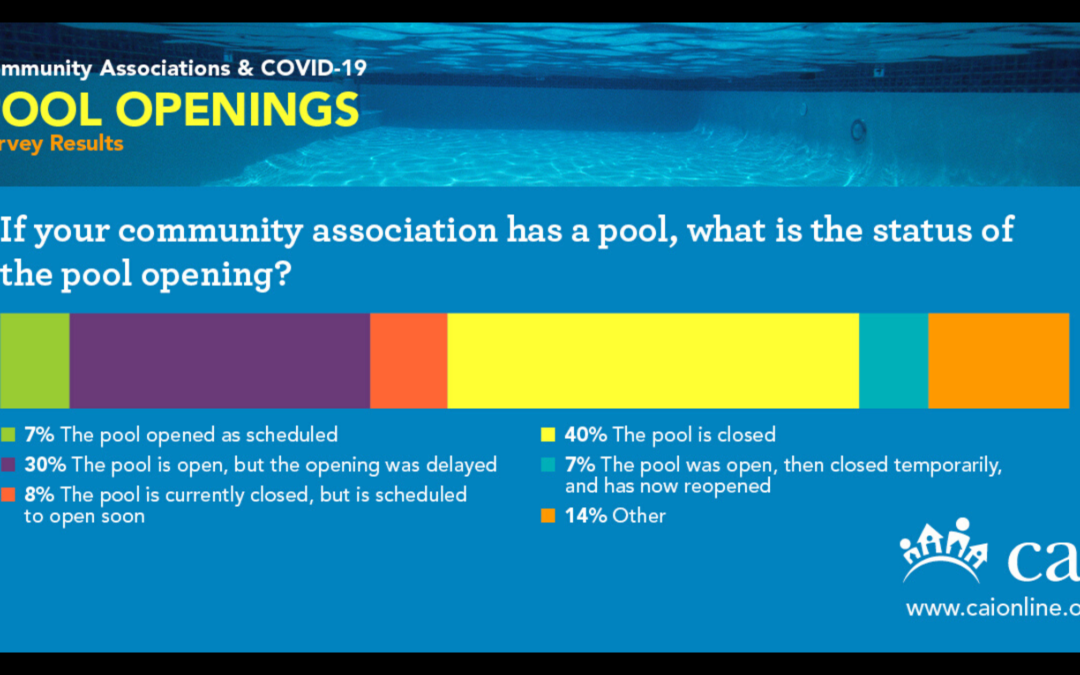Summer is in full swing, and the heat is rising, which makes a lot people think about cooling off in a pool. Many community associations have the desirable amenity, but are they open?
CAI surveyed its members between late June and early July to understand the decisions community associations have made regarding their pool(s). According to the results, only 7% of respondents reported opening their community’s pool on time, while 40% said their pool remains closed.
Several factors led communities to not open their pool as regularly scheduled, including fear of exposure to legal liability (58%); fear of spreading COVID-19 (50%); and attorney recommendation (48%). The communities that opened their pool reported instituting several new procedures, such as prohibiting guests (60%); requiring residents to sign a liability waiver (40%); and requiring residents to bring their own lounge chairs (37%). Expenses related to pool operation and maintenance are higher than budgeted due to COVID-19 in roughly 35% of communities.
The fear of legal liability is largely due to the insurance coverage typically held by community associations. General liability and directors and officers (D&O) policies often have an exemption of coverage for viruses or pandemics. With this void in coverage, insurance professionals and community association lawyers are advising their community association boards and managers to keep the facilities closed.
CAI continues to urge Congress and state legislators to pass legislation that provides liability protections to community associations if they define a method to open pools and other facilities while making good faith efforts to follow local, state, and federal guidelines, including guidance from the Centers for Disease Control and Prevention. North Carolina and Georgia are leading the way.
For example, the North Carolina legislature passed HB 902, a bill to mandate that owners and operators of community pools and their agents shall not be liable in any claim or action seeking damages for injury or death resulting from transmission of COVID-19 that is alleged to have resulted from the reopening of the community pool. The immunity provided will not apply to claims for injury or death resulting from gross negligence, wanton conduct, or intentional wrongdoing. Tom Skiba, CAI’s Chief Executive Officer submitted this letter urging Governor Cooper to sign the legislation. Team CAI; including the CAI North Carolina LAC and lobbyists worked hard to get this legislation passed to support the community associations in North Carolina and setting standards for other states to follow.
The Georgia legislature passed SB 359, a bill providing that any person entering the premises waives all civil liability against the owner and operator for any injuries caused by the inherent risk associated with contracting COVID-19, except for gross negligence, willful and wanton misconduct, and reckless infliction of harm or intentional infliction of harm by the individual or entity that owns the premises. Associations are specifically mentioned as covered entities in the bill.
While these new laws are helpful, associations may continue to choose to keep pools closed. Further, there are some local and state regulations that may restrict community pool openings or cause compliance to be too challenging for community associations. Visit CAI’s COVID-19 Government Actions webpage to see what your local and state regulations require regarding pools.
The Community Associations & COVID-19: Pool Openings report also uncovered interesting state-specific findings that may reflect the different approaches taken by state governments to slow the spread of COVID-19 and the differing philosophies on reopening. For example:
- More than 80% of respondents in New Jersey, 56% in Maryland, and 55% in Pennsylvania reported their pool is closed. These states had some of the more prolonged and restrictive stay-at-home orders.
- By contrast, fewer than 10% of respondents in Florida, 24% in Texas, and 29% in North Carolina reported their pool is closed. These states had some of the shorter and least restrictive stay-at-home orders.
- In New Jersey, fear of exposure to legal liability (84%), lack of insurance coverage (74%), and attorney recommendation (74%) kept pools closed.
- For the communities that opened pools, those in Texas (71%), Nevada (71%), Arizona (70%), and California (66%) lead the way in prohibiting guests.
- In Texas, 65% of communities require residents to sign a liability waiver, and 44% require residents to bring their own lounge chairs.




Our HOA opened up the pool/spa on July 2nd. Homeowners/tenants had to sign a waiver. Use of this Facility at Your Own Risk. Only residents of this HOA (no guest). All HOA pool furniture was removed. Spa heather/jets were turned off.
The spa is now a wading-pool with designated social-distance spots (6′ to 7 /12′ apart). Sanitizer dispensers were placed in each restroom and one in the pool area (by the outside shower) Restricted access to pool/spa to one gate opening